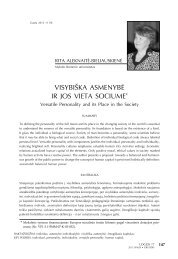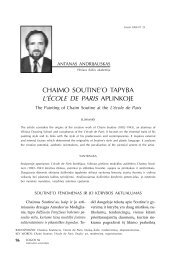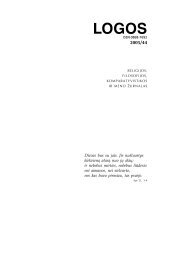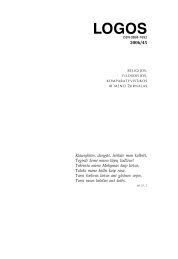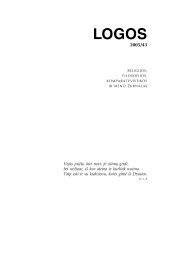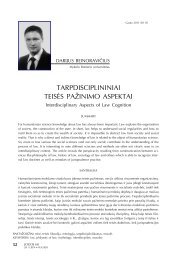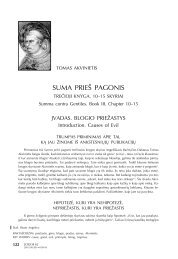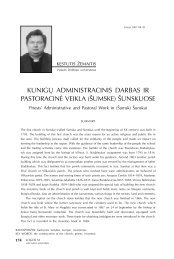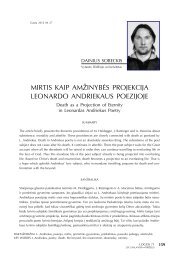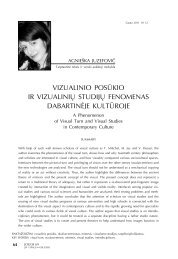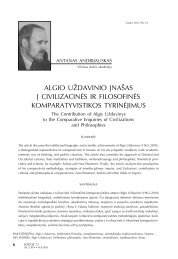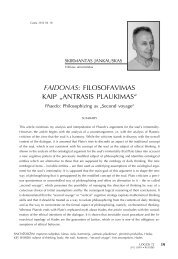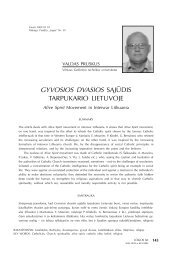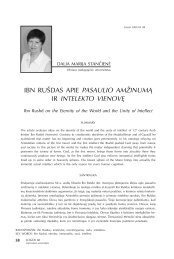Bet kvailas žmogus įgis supratimą, Kai laukinė a - Logos
Bet kvailas žmogus įgis supratimą, Kai laukinė a - Logos
Bet kvailas žmogus įgis supratimą, Kai laukinė a - Logos
Create successful ePaper yourself
Turn your PDF publications into a flip-book with our unique Google optimized e-Paper software.
Gauta 2005-02-23<br />
VACLOVAS BAGDONAVIÈIUS<br />
Kultûros, filosofijos ir meno institutas<br />
VYDÛNO ESTETIKOS BRUOÞAI<br />
Traits of Vydûnas‘ Aesthetics<br />
SUMMARY<br />
MOKSLINË MINTIS<br />
The aesthetics of Vydûnas is an integral part of his culture theory. That theory is based on the Hindu<br />
Vedanta pantheistic concept of being, according to which the spiritual absolute makes the whole reality<br />
and is both immanent and transcendent in relation to the world. By way of evolution, the world<br />
goes back to the state of pure spirituality from which it originated. Man is a being which has already<br />
reached that state. His essence – humanity – belongs to the sphere of pure spirituality. By means of his<br />
essence, he influences the world and creates culture. Along with science and morality, art is one of<br />
three major ways to create culture. Following this way, the creative power expresses itself through perceptible<br />
beauty. In nature, the creative power, the propagation of beauty represents growth, progress,<br />
blossoming, youth. The absolute spirit is present in all that. In art, the human spirit is a creative subject.<br />
By means of artistic creativity, not only the spirit of the creator, i.e. of the artist, expresses itself,<br />
but also the lives of other people are involved in the spiritual evolution of the world. This is not only<br />
the social but also the existential mission of art. The influential power of art mostly depends on the<br />
level of the brightness of the artist’s spirit. The different kinds of art originate from various kinds of<br />
material used in creative activities.<br />
Po pirmos paþinties su Vydûno filosofija<br />
daþnam susidarydavo áspûdis,<br />
kad ji ið viso be sistemos. Ne vienam<br />
apie Vydûno kûrybà raðiusiam autoriui<br />
jo filosofiniai veikalai atrodë kaip eklektiðki<br />
ávairiø filosofiniø ir religiniø idëjø<br />
ÁVADAS<br />
miðiniai. Bene autoritetingiausias ið taip<br />
maniusiø yra V. Mykolaitis-Putinas, paraðæs<br />
iðsamià studijà apie Vydûno dramaturgijà<br />
(6). Toks áspûdis apie Vydûno<br />
filosofijos pobûdá yra apgaulingas.<br />
Vydûnas ið tikro formavosi veikiamas<br />
RAKTAÞODÞIAI. Absoliutas, kultûra, kûryba, groþis, menas, evoliucija, þmogus, dvasia.<br />
KEY WORDS. Absolute, culture, creativity, beauty, art, evolution, man, spirit.<br />
LOGOS 42<br />
2005 BALANDIS • BIRÞELIS<br />
19



